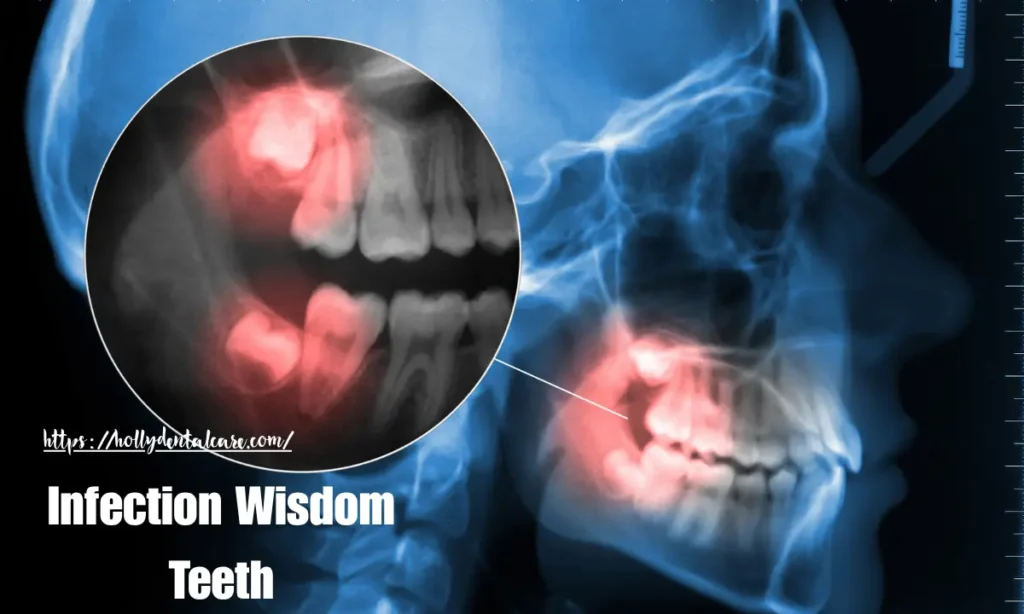Infection Wisdom Teeth: There are a lot of complications concerning wisdom teeth probably because people have a harder time keeping them clean. Food and bacteria can easily become trapped between the tooth and the surrounding gum tissue-making it an easy target for infection, especially in this hard-to-reach area way back in your mouth that is seldom cleaned properly through brushing and flossing.
Sometimes, even if wisdom teeth try to grow, they don’t grow in the right manner because of some obstruction. This undergrowth may be accompanied by angulations that are awkward or completely sideways; such is the scenario known as an impacted wisdom tooth. Reports say that partially impacted wisdom teeth are a high-risk area. The irregular position of these teeth promotes higher decay. An infection or a cavity is when bacteria thrive to make their way through the hard outer enamel layer of the tooth.
What is Infection Wisdom Teeth
Wisdom teeth erupt at their latest between the ages of 17-25, more so for many people, a burden rather than a benefit. Infection is one of the most common problems, whereby food particles, bacteria, and plaque get trapped around the partially erupted or impacted tooth.
Because they are hard to clean, and often grow in at strange angles, they are more likely to become infected. Here, it begins when bacteria are trapped under the flap of gum closing over a partially erupted tooth. It may initially seem like a mild ache, but if left untreated, it may rapidly evolve into worse pain and/or swelling.
How infection occurs
Different bacterial agents can infect the wisdom teeth around an impacted or partially erupted tooth. Most of these infections are localized to that particular wisdom tooth and strangely, they sometimes get into the surrounds infecting other structures of the mouth, jaws, and even the head if left untreated.
Importantly present bacteria in relation to wisdom tooth infections include:
- Streptococcus
- Actinomyces
- Peptostreptococcus
- Prevotella
- Fusobacterium
- Aggregatibacter
- Eikenella corrodens
If the area is not kept clean very well, such bacteria can grow within the warm moist surroundings of a wisdom tooth. Thus, it becomes imperative for early intervention of wisdom tooth infection so as to prevent serious complications.
Causes and Types of Wisdom Teeth Infection
- Bacterial infection as an etiological agent: the usual pathogenic microorganisms involved
- Manipulated wisdom teeth and the risk factors for infection
- In addition, reasons may include cyst formation, gingivitis, and caries.
- Moreover, important risk factors making them susceptible are poor oral hygiene. Along with immune disorders and smoking.
Symptoms and Diagnosis
- Usually associated with signs and symptoms of pain, swelling, discoloration, or any unpleasant taste/smell and trismus.
- Systemic manifestations at advanced stage: fever and swollen cervical lymph nodes.
- Diagnosis: clinical examination with dental radiographs and computed tomography scan in some.
- Differentiation of wisdom teeth infection from other dental and oral health problems.
Home Remedies
Home remedies can’t heal or cure your infection however, it helps to lessen the pain and discomfort from it while one waits to visit a dentist.
- Mix salt in warm water and swish around your mouth before spitting it out as this salt-water rinse helps reduce bacteria and does soothe irritation.
- Put Hydrogen Peroxide mixed with equal parts of Water and then make use of it as a mouthwash. It cleanses the area and lessens surfacelings of bacteria, but does not swallow.
- Hold an ice pack or cold compress against the area of your affected cheeks. This can help with the swell and probable pain numbness.
- Take a dab of clove oil in a cotton swab then gently apply it to the affected gum. Clove oil has properties containing natural essential oils that combat bacteria and pain.
- Some short-term relief can be obtained through the application of benzocaine numbing gels.
Relief in such cases can be temporary only; moreover, it needs professional treatment by a dentist, so do not delay your visit.
Medications for Infection Wisdom Teeth
Your dentist will probably prescribe you with antibiotics in cases of a tooth infection treatment. These medications typically help to clear up infection and prevent its spread to the rest of the mouth or body. In many cases, you will wait at least a week before performing dental work, such as filling or extraction, because you will need to take an antibiotic course before the dental work.
Common antibiotics used for infected wisdom teeth include:
- Penicillin
- Amoxicillin
- Metronidazole
- Clindamycin
- Erythromycin
For pain and swelling caused by it,over-the-counter or prescribed pain relievers may be recommended, including:
- Ibuprofen
- Lornoxicam
- Acetaminophen
- Aspirin
Treatment Options for Infected Wisdom Teeth
- Relief from pain; warm salt water rinses; when a bacterial infection is present, antibiotics are indicated.
- Professional dental treatment includes: cleaning under the gum fold; drainage when abscess occurs.
- Indications and timing for when extraction is required.
- Care post-extraction in order to prevent infection and favor healing.
- Complementary therapies or prophylactic procedures before surgery.
Prevention
- Regular check-ups and development of wisdom teeth along with x-ray pictures.
- Recommended nutrition and lifestyle change to reduce the chances of getting an infection
- Early extraction under high-risk conditions
- Signs to recognize and when to seek prompt care by a dentist
Conclusion
To cure infection wisdom teeth, severe painful and disruptive activities can be performed, but such conditions are treatable. Early signs including soreness, swelling, and tightness of jaws can be avoided from more serious complications occurring later.
To take care of the most serious problem, antibiotics , dental cleaning, or extraction, it’s time again to go fast. Keep up with dental check-ups, good oral hygiene, and don’t ignore really unusual things. Prevention of wisdom tooth infection now will save much discomfort in the future.
Also read:- The Spoon Athletic Fitness Tips: Your Guide to Peak Performance



